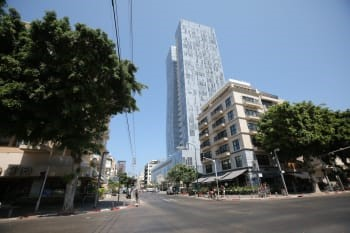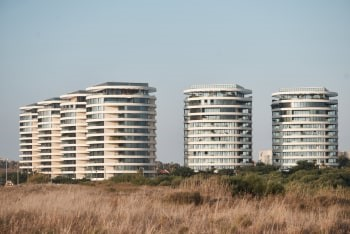The Marker, Meirav Moran, 22.03.2020
Residential management and maintenance companies applied early last week to recognize building management as a vital sector of the economy. The letter was addressed to the Minister of Health and the Economy and the heads of the National Security Council, on behalf of five large management companies incorporated in the association and cumulatively managing close to 350 employment, commercial and residential towers, of which more than 10 million square meters in common are responsible for more than 14,000 families. The companies warn that if operating crews are prohibited from reaching and performing their duties in buildings beyond the daily routine, tenants will be at risk of life because of the complex systems required for the operation of a tower and require constant supervision.
Also, management companies - the era of two management and holdings, promoter, levels, asset management and High Tower - argue that providing services through them will reduce the interaction between tenants and themselves, contributing to reducing the spread of the virus .
In addition, the companies noted that in case of full closure, the presence of management and retention teams in office towers and especially in commercial centers should be ensured.They warn that regular monitoring of facilities and systems is required, because in the event of a failure, it may pose an environmental hazard. The building managers expressed concern that, provided closure and isolation of areas would be criminal, burglary and looting for the commercial and office towers that would remain vacant.
Concern for hundreds of thousands
The heads of the association believe that their request for state institutions expresses the needs of the owners of office buildings as well as of hundreds of thousands of other Israelis living in towers throughout Israel. They believe that the need for recognition of growers maintenance and operation teams as an essential industry will soon be joined by other home management companies of their kind.

Tower in Arlozorov 17 in Tel Aviv Photo: Ofer and Kenin
Towers run by Hi Tower Company, one of the Emergency Recognition Initiatives Initiative - which manages, among others, luxury towers in central Tel Aviv, Moshe Aviv Tower in Ramat Gan and the large residential complexes Blue and TLV - formulate a procedure in case a tower is closed on a particular area, The tower or closure is complete throughout the country. Mickey Barel, a former IDF commander and owner of High Tower, points out that the procedure was designed for a reality where the buildings' maintenance and management employees could continue to be employed.
In the closed procedure, the guardian's role will be to lock doors and openings to the lobby and car parks to prevent pedestrians and vehicles from entering except emergency crews. Couriers of food and supplies will not be allowed to move into the apartments, and may leave them at the entrance. The guard will manage the gathering and movement in the common spaces - the occupants will be invited to arrive at time intervals so that they descend and climb individually in elevators and do not meet each other in the hallways or lobby.
The company also has a procedure for reducing internal manpower, if the state limits a number of employees or employees are sent for isolation - a "spatial management" map for a team that oversees several towers simultaneously. "Leaving a tower unattended is a life-threatening problem for hundreds of people who live in it. A routine malfunction like cracked pipes and floodwaters can paralyze lifts that skilled workers prevent in simple operations. If they are not in the field, there will be no one to do so, and the elevator means paralysis. The building, also for food supply and medical staff access. In the event of a fire in the tower the primary treatment is of a maintenance man, if he is absent until the arrival of the fire rescue personnel will spread, in a tower inhabited by these families is in danger of danger, "said Barel.
The building managers will be notified of occupants sent for isolation and they have been instructed to follow the instructions. If they identify isolated people who have gone out into common areas of the building, they should make a comment once and in case of repeated violation - report to the authorities. "It's impossible to hide in our buildings carriers. If there are symptoms, MDAs come and everyone sees where they came from and where the suspect came from as a patient. We are responsible for the safety and lives of tens of thousands of people. If it is a false alarm - the role of growers' managers is to calm down. If you need to stay away from someone - our job is to keep them away from danger. "
Contrary to the trends in the issuing of employees to the ISA and the dismissal.

Blue towers project Photo: Dor Kadmi
Building managers are the trusted source of information
"The call to close a home inherently reduces the chances of contact with others, but for a large number of people in Israel, the home is a tower where an entire street actually lives," says Dorit Gurfunkel, a city planner and lawyer who studies the Technion's grower area."Every exit from the doorstep of the apartment involves a passage in the hallway, elevator, lobby, or underground car park - enclosed, small and non-ventilated spaces, which are carried by dozens of people and also carry. Thus, any stay in the common area, pressing the elevator button, opening the intercom or the front door , Raises concern about a virus encounter. "
Hi Tower manages about sixty towers in the center of the country and closed the gyms and pools this week in all buildings and luxury towers. Company staff at the towers were instructed to increase the cleanliness of the elevator from time to time three to five times a day, and tenants were issued guidelines to maintain distance in the common areas.
Barel emphasizes that as the bans are tightened and the demands of isolation tightened, the office buildings will be emptied, and hundreds of thousands of people will be imprisoned in the residential buildings for twenty-four hours a day, seven days a week. "Even on a routine basis, management companies play some of the functions that the municipal government performs on the streets. When growers are fully occupied and in emergency situations, the need to maintain reasonable living conditions becomes more critical and more complicated. Water and electricity and the safety of elevators and safety controls, "says Barel.
He says building managers have become community managers in times of crisis - the factor that informs the health of neighbors. "We are the reliable and objective source of the information flow in the Wetsap groups and tenants' circulation."
Gurfinkel adds that many residential managers define themselves as "touring psychologists. They perceive themselves as responsible for mitigating conflicts. This is important in maintaining residents' resilience."
An explosive and unique combination of children and towers
"When you first cling to the tower, it is inevitable that the Ministry of Health will order a closure for all its residents, and if not - then its occupants will panic for it," says Professor Rachel Alterman, city planner, legal and researcher at the Samuel Neaman Institute at the Technion. "Therefore, if I were the Ministry of Health, I would first of all shut down towers that are adhesion multipliers and panic multipliers. The stairwells and elevators use more people. The friction and statistical chance of getting infected cannot be prevented. The elevator is a small, opaque and shared space."
Alterman says that the combination of the size of an average family in Israel with a residence in the tower - is an explosive and unique type in the world.In Israel, each family has three times as many children as Hong Kong and Singapore, which are characterized by growing neighborhoods. It is difficult to keep them at home all the time, and to monitor them even when they go out for a short time. Alterman notes that almost no international research has been conducted to date on the implications of towers for public health. "Not in its favor, Israel is currently becoming a living laboratory of the issue."
No response was received from the NSC.



